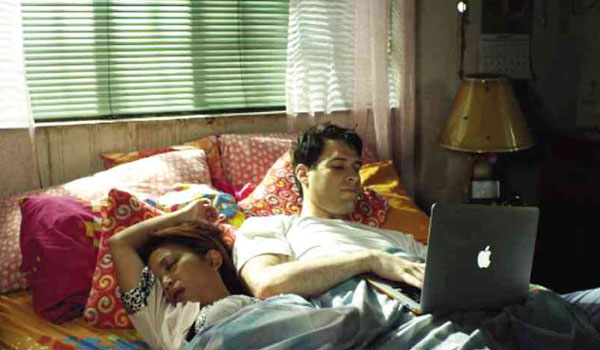It all started in an upscale mall in Makati, recalls Randolph Longjas, the debuting director behind “Ang Turkey Man ay Pabo Rin,” an entry in the ongoing CineFilipino Film Festival.
Longjas and his friend, scriptwriter Ronald Allan Habon, were brainstorming in a coffee shop when they noticed petite Filipino women escorted by tall Caucasian men in a nearby restaurant.
They realized that cross-cultural relationships had become commonplace in the country. “It’s now a familiar scenario in Filipino families, including mine,” Longjas explains. “My cousin met an American online; they’re now happily living in Florida.”
Longjas cast comedienne Tuesday Vargas as a cyber-savvy Pinay married to an American, played by Internet sensation Travis Kraft.
Differences
Kraft’s partner in real life is a Filipino woman. His YouTube channel has generated 9,579,923 hits and attracted 13,248 subscribers to date. It features his videos on Filipino culture and tourist spots, and his interviews with local celebrities like Carmina Villaroel, John Lapus, Barbie Almalbis, Ramon Jacinto and the bands Kamikazee and Parokya ni Edgar.
Cultural differences is a bottomless font of comedy. “We wanted to depict Filipino-American relationships in a fresh light,” Longjas says.
But they made certain to go beyond stereotypes. “We want to quash the common perception that these unions exist only because of money or financial considerations,” he says. “We want to prove that this kind of relationship can be based on love, and real as anyone else’s.”
Longjas wants to present strong female characters, too.
Who rules?
“One of our goals is to empower Filipino women in this type of cross-cultural affairs,” he asserts. “Foreigners have long walked on our shores, colonized our country and influenced our culture. We want to show how a Filipino woman rules the basic unit of our society, the family.”
Make that an extended, kooky clan. Cast as Vargas’ gal pals and fellow cyber-chicks are Julia Clarete and Cai Cortez. Vargas’ brother is played by JM de Guzman and her parents, by Rolando Inocencio and Madeleine Nicolas. Child actor Micko Laurente portrays Vargas’ son.
As Vargas herself would point out: The whole ensemble, not she, is the star of this film.
“I am lucky I got actors who were very focused,” Longjas recounts. “I didn’t have to exert extra effort for them to understand their characters. They were participative, generously sharing their ideas on how their characters would react in each given situation.”
Longjas relates that he was open to suggestions precisely because he was a newcomer. (He currently works as a production staffer in advertising.)
“I’m a newbie, and creating a movie without a producer is suicide,” he admits. “With the help of family and friends, I was able to finish the shoot, one day at a time.”
Like other indie filmmakers, he had to grapple with financial woes. “Budgeting is a management or administrative problem, but as a director, I also had to face creative issues. I had to overcome fears about my job. I was worried that my shots were not at par with industry standards, that I wasn’t motivating my actors properly.”
When push came to shove, he relied on the guidance of his staff and mentors.
Something new
As a first-time filmmaker, he wanted to make a difference. “Our goal was to veer away from the usual theme of poverty porn,” he clarifies. “We wanted to offer something new to the audience.”
Cross-cultural marriages are “usually despised or laughed at,” he says. “This experimental comedy explores the trials, tribulations and triumphs of two people on a universal love trip … which does not discriminate against color, stature, age or culture.”
Think “Modern Family,” but set in the palengke and eskinita.
He sums up “Turkey,” thus: “It is a celebration of the Filipino experience from a foreigner’s perspective, and the realization of the American dream through a Filipino’s eyes.” Bayani San Diego Jr.
